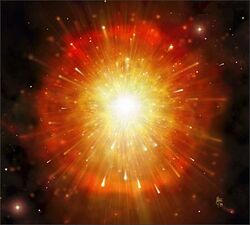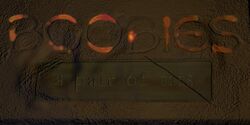Mega Blast
Mega Blast is an international project led by a congregation of prominent scientists vainly trying to save the Universe. They plan on doing this by creating a sequence of Small Bangs, which will cause a sediment of sound- and shockwaves large enough to be the equivalent of something between a Big Bang and a Mediocre Bang. The resulting catastrophe will bring back the universal Entropy balance, which lately has been quite lost. The Entropy balance, in turn, is a factor of such importance and complexity that we will only skim the issue in this article, which will possibly be read by an audience with limited faculties. Suffice it to say that without a balanced Entropy, the Big Crunch would become impossible to attain. Anyone can see that would be negative.
Bangs; different sizes[edit]
- For the reader to understand any of this article he or she will first need to understand what a Bang is, and why size matters.
The theory of a Bang is not as simple as one may think: perfecting it has required the absolute thinking power of thousands of powerful minds all over the world. Those minds were so brilliant that, if converted into darkness, their deduction power would blot out the Sun itself. This should give the reader an idea of the scale of properties in question. What's more, those scientists have all been remarkably powerful in physical build, as they have all been champions in either wrestling, bodybuilding, or boxing.
- A mind is not always enough.
The theory of a Bang was first developed in 1808, when a well-known scientist of the era happened to by standing by a road. He noticed a peculiar whistling sound, and realized a little bird had made it. When he tried to kill the bird by throwing a stone at it, he noticed that the bird swerved aside quite effortlessly, while the stone veered downwards and hit the ground. The scientist fairly swooned where he stood. His knees gave way, and the next thing he knew he was in a hospital, suffering from a nervous breakdown.
Later that year, the nervous brokendown scientist realized there were different sizes of Bangs in the known Universe - which itself had probably been born out of one. The scientist - whose name we cannot reveal for copyright and legal reasons - deduced from his all-round experience that the Bang to give birth to a Universe would have to be fairly big. Thus he postulated his theory, and, of course, died later that day, why not.
Big Bang[edit]
The Big Bang happened quite a while ago, allegedly giving birth to the known universe. It is worth mentioning there is only circumstantial proof of that. What is certain is the Bang actually happened, and that it was the biggest Bang so far. Mankind, for all its efforts, can hardly hope to compete with such a Bang. Its echoes still ring around the universe, bouncing about like a million cats trying to get out of a car wash.
Mediocre Bang[edit]
Far smaller than the Big Bang, a Mediocre Bang nevertheless packs quite a lot of punch. If you ever heard one, you would be deaf for the rest of your life, or more likely just dead, and deaf for the rest of your dead too. It is not impossible to prove scientifically that there have ever been any Mediocre Bangs, but nobody has found a method yet. The Andromeda galaxy has clear remnants of particles that may have resulted from Mediocre Bangs, but this is just hearsay. Nothing has been proven. There are those among the scientific community who claim the Universe is absolutely rife with Mediocre Bangs, but we have the names and addresses of those people.
Small Bang[edit]
The smallest of Bangs so far is the Small Bang. This is something so tiny that even mankind is able to produce one, aye, even several. The Universe can count itself among the lucky ones because of this (we will get back to this later in the article). Note that even smaller Bangs than that are theoretically possible. They don't interest anyone because their effects are of no consequence. If you want to know something about "Very Little Bang" or "The Smallest Of Bangs", you can go visit some backwoods university somewhere nobody has even heard of, and ask the half-blind old professor to produce one with his chemistry set. Even he will probably just shrug and shuffle away, shaking his atrophied skull in disgusted bafflement.
Sound waves, horn section, open railway car, twelve professors[edit]
Later on in the 19th century, a clever test was made: a horn section - carried on an open railway car - was playing something or other while twelve professors were standing beside the track. Seemingly the sound waves were of premium importance in the study of Bangs. It appears that all sound waves have something in common - so probably some conclusions could be drawn. It had to have something to do with sound traveling through air. Later it has become clear that there is no air in space, so the Big Bang could not have been heard, and maybe should be renamed the Big Flash. This is actually a good thing because of the deafness effect mentioned earlier. Note that the railway car was actually moving. This was a clever ruse invented by the designers of the test situation. The experiment proved significant on many levels, most of which are far too difficult for the reader to understand. The results include hearing AIDS, guided dogs and the beeping sound meant for pederastians.
Properties of the twelve listening professors[edit]
The number of professors listening to the aforementioned sound waves had to be twelve, because Jesus had twelve disciples. Just like the disciples of Jesus, these professors had long beards and stovepipe hats. It appears that at least a few of the professors had to be deaf for them to understand how sound waves cannot travel in airless space.
Different theories about Crunches[edit]
Unlike the clearly recognizable Bangs, there is no conventional procedure of distinguishing different sizes of Crunches. Some simply say that the "size" of Crunch corresponds to the size of the Bang that gave rise to the universe in question. Experts, however, state that since the growth rate of universes can be very irregular, the size of the initial Bang has no notable correlation to the evolution of that universe. While some scientists argue that Bangs are instantiated by Crunches (and thus could be classified accordingly), others vehemently disagree, saying that there is no empirical evidence whatsoever to back up such claims.
Entropy[edit]
This is the spot where the article, quite expectedly, runs out of steam.


